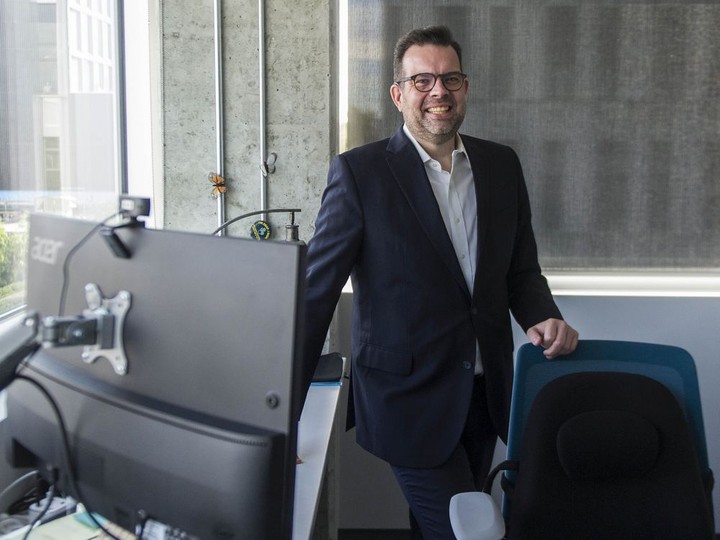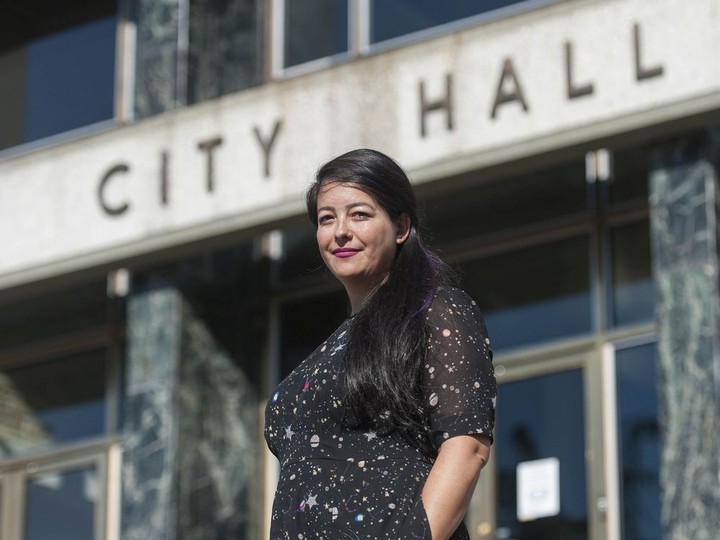people with 'invisible disabilities' are being left out
governments, especially at the local level, slow to adopt closed-captioning for the hard of hearing
we apologize, but this video has failed to load.
try refreshing your browser, or
tap here to see other videos from our team.
tap here to see other videos from our team.
after years abroad, steffani cameron returned to ottawa to a disappointing welcome. despite being hearing impaired, cameron regularly enjoyed live theatre and, to mark her homecoming, she’d planned a night at the national arts centre.but without captioning, the threads of audio that reached cameron’s hearing aids weren’t enough for her to piece together and she struggled to understand the performance.“i didn’t hear any of the dialogue, i missed 90 per cent of what was going on in the show,” she said. “i came home crushed. this experience that i thought was going to be my canadian welcoming home and everything just left me … depressed.“i mean, i saw opera in croatia, and it was completely closed captioned.”closed captioning transcribes audio to text, both spoken words and non-speech elements such as sound effects and speaker identification.cameron works part-time doing captioning, seeing firsthand how captions improve the accessibility of film and television. but when attending conferences and council meetings, where captions are hardly ever offered, she is always aware of the difference they would make.captioning is essential for the deaf, deafened and hard of hearing — people like cameron — who are nearly five per cent of the population, or 1.3 million canadians, according to the most recent data from statistics canada. the canadian association of the deaf puts that number much higher, at 10 per cent, estimating that 3.8 million canadians have hearing loss, with more than 380,000 estimated to be profoundly deaf.canadians aged 65 and older, 18 per cent of the population, are more likely to be affected, with 12.2 per cent of seniors reporting a hearing disability. canada’s seniors will make up 23 to 25 per cent of the population by 2036, driving an even greater need for communication accessibility.accessibility is an issue that worries many.also affected are those who speak english as a second language and those with learning difficulties.
advertisement

the b.c. seniors advocate, isobel mackenzie, outside victoria city hall.
chad hipolito
/
png
“an informed citizenry is necessary for democracy to flourish,” said b.c. seniors advocate isobel mackenzie. “it starts with not just engaging in elections — it’s engaging every day and understanding what’s going on.”local government affects our day-to-day lives more than the federal or provincial governments, said mackenzie. but at the local level, communication accessibility is at its weakest.step 1 is the recognition of these “invisible disabilities,” she said. “we need to start pushing the envelope to have that broader understanding that a disability is more than just somebody with physical mobility limitations.”vancouver, surrey and richmond are among b.c.’s largest municipalities, each with a large tax base, and yet none captions council meetings. victoria, a city of just 92,000, has captioned its council meetings since 2019.at $10,000 a year for auto-generated captioning, a fraction of victoria’s more than $260-million budget, mayor lisa helps sees its cost as far from prohibitive. in terms of accessibility, she describes it as “low-hanging fruit.”“closed captioning is one thing that councils can do to send the signal that the city is working on accessibility,” helps said. “it’s really important to me as mayor because we want victoria to be an inclusive and welcoming place — regardless of people’s ability.”“it’s about inclusion, having a stronger and more robust democracy. building an inclusive city creates resilience and creates diversity. and the more people we have engaged in, and able to participate in, council discussions … the better and more resilient democracy we’re going to have locally.”it takes time and money to address barriers to physical accessibility, helps said, but that isn’t the case with captioning.in vancouver, communications manager kirsten langan said that captioning of council meetings is “currently being reviewed by staff” and that the process was “put on hold last year due to budget restrictions resulting from the pandemic.” in surrey, communications project manager amber stowe said the city is “in the process of exploring options,” with only a few events captioned.commitment to hearing accessibility varies among other local decision makers, such as park and school boards, regional boards like metro vancouver, and transportation authorities like translink that all play large roles governing our daily lives.at metro vancouver, “various options for closed captioning are under consideration,” said communications specialist greg valou.at translink, which operates across canada’s largest single transit service area and oversees more than 250 million rider journeys annually, board meetings have been captioned at no cost through youtube since 2016. the decision to publish to youtube “was a natural one,” centred on the accessibility of the platform, said translink spokesperson gabrielle price. “we wanted to ensure that anyone who wants to participate could participate.”recent changes to federal legislation pave the way to developing accessibility standards canada-wide, but without a clear framework for regulation and enforcement, compliance cannot be guaranteed.regulation is possible. for example, the canadian radio-television and telecommunications commission has required canadian broadcasters to caption 100 per cent of their programming since 2007. yet accessibility remains unregulated in many other canadian sectors.the 2019 federal accessible canada act aims “to make canada barrier-free by jan. 1, 2040.” but it applies only to organizations under federal jurisdiction. and any standards set as a result of the act are voluntary and become mandatory only if and when these standards are turned into regulation — something that could take years.it’s all “aspirational,” mackenzie said of the federal legislation. “it’s not a bad thing, but it doesn’t get to the meat of what we are going to have to do to improve it.“for people with physical disabilities, we’re miles ahead of where we were 30 years ago. … so maybe the next 30 years is going to focus on these ‘invisible disabilities.’”carla qualtrough, federal minister for disability inclusion, did not respond to calls.retired physician hugh jones, at age 78, has relied on hearing aids for over two decades. before then, he “managed to limp along,” doing what was necessary to cope with his worsening hearing, such as sitting close to those speaking at meetings.“i’m fortunate that i can afford the really sophisticated hearing aids,” he said. their price is out of reach for many. but even with hearing aids, he still experiences barriers to accessibility due to the acoustics of some locations, a difficulty closed captioning would help overcome.provincially, the schedule for ensuring accessibility regulation is little better than at the federal level. mla dan coulter, b.c.’s parliamentary secretary for accessibility, says change “might be a ways off” and that “standards generally take about two years to develop.”according to the 2021 accessible british columbia act, these standards are to be developed by an 11-person provincial accessibility committee, and deadlines are loosely defined.“there is sort of a 10-year timeline that’s laid out in the legislation,” coulter said. “we don’t want to set up artificial deadlines for anything … there’s no possible way that we could identify every single barrier in society and say we’ll be able to remove them in 10 years.”to coulter, the b.c. law enables further steps. “it’s like a skeleton and now (the b.c. government) needs to put meat on the bones.”but gabrielle peters, who calls herself a disabled writer and consultant, said not enough is being done.peters was contracted by the broadbent institute to do a report to help develop the accessibility legislation in b.c. but when the accessible british columbia act was introduced in april and passed in june, she didn’t see her work reflected in the legislation.the most important parts of accessibility legislation — clearly defined deadlines and enforcement mechanisms — remain weak, she said.the act does allow for inspections and fines for non-compliance. the extent of enforcement is vague, compliance is mandated only for the provincial government and “prescribed” organizations, there is no mechanism for complaints to be submitted by the public and there are no timelines for implementation.“what’s the point? it’s like a wish. it’s like, you might as well open your window and look for a shooting star to wish on,” said peters.the wavefront centre for communication accessibility, formerly the western institute for the deaf and hard of hearing, works to eliminate communication barriers across b.c.

ceo christopher sutton of wavefront centre for communication accessibility.
jason payne
/
png
advertisement
“legislation doesn’t exist in every province or every jurisdiction,” said wavefront ceo christopher sutton, “so there is not really a lot of consistency.”ontario passed the accessibility for ontarians with disabilities act in 2005, the oldest legislation of its kind in canada, establishing the goal of achieving provincewide accessibility by 2025 and requiring ontario businesses and non-profits to submit compliance reports every three years. manitoba, in 2013, and nova scotia, in 2017, followed suit, passing their own accessibility acts.“when i’ve worked with municipalities on accessibility, the people that are working on those portfolios, very knowledgeable, very excited, they’re passionate about it,” said sutton. “but getting it up to the city, the general manager or the city manager, or the budget makers, that’s the challenge. … at the end of the day, a lot of people see the cost for accommodations to be very burdensome, but generally it isn’t.”youtube offers free auto-generated captioning, though the quality can be poor if not monitored and edited. other providers offer auto-generated captioning, supplemented by artificial-intelligence software, for about $10,000 a year. human-generated, real-time captioning costs $150 an hour or more.“we need to incorporate accessibility as a budget line item. … it’s a cost of doing business,” sutton said.

new westminster city councillor nadine nakagawa.
jason payne
/
png
advertisement
in january 2020, new westminster coun. nadine nakagawa tried to bring closed captioning before her council as part of a motion to address a range of accessibility issues. she worries that, if left to the discretion of municipal governments, changes will be less likely to occur.“and if we’re waiting for people from the disabled community to raise this, we’re functionally excluding them from being able to be a part of community discussions to start with,” she said. “it’s a way that the status quo replicates itself.”with the onset of the covid-19 pandemic, priorities shifted. nakagawa’s motion was set aside.accessibility of local government is also of concern to immigrant settlement groups, but they are more concerned with language accessibility. to the immigrant services society of b.c., doing away with lesser-known acronyms and government jargon would increase accessibility across the board.in 2019, canada welcomed more than 341,000 new permanent residents. and, some 21.9 per cent of the population had immigrant or permanent resident status in 2016, according to statscan.“what would help more than anything else is a commitment from the (city) councillors, who are doing the speaking, to speak in plain language,” said lisa herrera, lead instructional co-ordinator for the society.when barriers to accessibility are removed, everyone benefits, she said: “if you make something accessible to the people who have the disability, or the people that would have trouble with accessibility, you actually make it more accessible for everybody.”to people such as steffani cameron, the changes needed are clear — and clearly beneficial to all.“if we’re making it so that it’s only easy for people who are perfectly healthy … then our society is being geared to those people as well, because you’re not hearing everybody who needs to have their voice heard,” she said.“until you mandate it, people don’t do it. nobody’s going to do it unless it’s profitable, and it isn’t profitable to (care) about the hearing impaired.”tyson burrows is a 2021 recipient of the langara college read-mercer journalism fellowship. this story was produced through the fellowship.
click here to report a typo. is there more to this story? we’d like to hear from you about this or any other stories you think we should know about. email vantips@postmedia.com.
click here to report a typo. is there more to this story? we’d like to hear from you about this or any other stories you think we should know about. email vantips@postmedia.com.
 8 minute read
8 minute read
